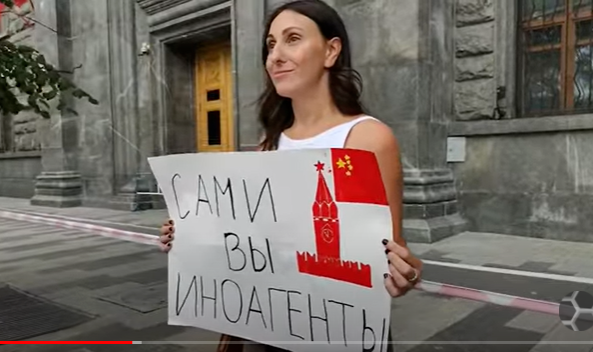On June 29 the Russian State Duma passed a so called integrated “foreign agents” bill in the third reading.The new legislation expands the interpretation of the term ‘foreign agent’ and will make it easier for the Russian authorities to label domestic critics as ‘foreign agents’. It will be enough to declare that the person or organization in question is under “foreign influence” to blacklist them as ‘foreign agents’. Independent Russian news site Meduza explained what’s new and what's not.
 Journalist of Dozhd protests 'foreign agent' law in front of the headquarters of the FSB: 'You are foreign agents yourselve' (screenshot)
Journalist of Dozhd protests 'foreign agent' law in front of the headquarters of the FSB: 'You are foreign agents yourselve' (screenshot)
Any charitable, scientific, or cultural organization can be labeled a ‘foreign agent’
Many Russian organizations have been blacklisted as “foreign agents” because the authorities deemed them involved in “political activity.” This concept is interpreted extremely broadly in Russian law — even publishing opinions on official decisions can be considered “political activity.”
At the same time, the current law regulating “NGO foreign agents” clearly defines the types of activities that cannot be considered “political.” This includes, for example, charity work, scientific activities, providing social support to people with disabilities, and promoting healthy lifestyles. Nevertheless, several organizations involved in these kinds of work have been declared “foreign agents.”
In October 2021, Novaya Gazeta editor-in-chief and Nobel Peace Prize laureate Dmitry Muratov urged President Vladimir Putin to clarify this law’s vague criteria. In response, Putin promised that the grounds for putting people on Russia’s “foreign agents” list would be reassessed.
The integrated “foreign agent” bill has retained the same list of activities that cannot be considered “political.” It was even expanded a little ahead of the second reading. At the same time, lawmakers inserted a clarification that changes everything. Under this amendment, any activity on the list could be considered “political” if it contradicts:
Russia's national interests;
The fundamentals of law and order in the Russian Federation;
Other values protected by the Russian Constitution.
Russia’s “national interests” are delineated by presidential decree so now the leaders of any organization — no matter the focus of its work — will have to take this into account. In other words, the new legislation does away with the formal exceptions, giving the Justice Ministry free reign to designate any organization a “foreign agent” in full accordance with the law. After all, the ministry is also responsible for determining what runs contrary to Russia’s “national interests.”
What constitutes ‘foreign influence’ remains unclear
In order to declare a person or an organization a “foreign agent,” the Russian Justice Ministry must, in theory, find evidence of the receipt of foreign funding or support. Under the new legislation, it would be enough for the authorities to declare that the person or organization in question is under “foreign influence.”
Lawmakers have failed to explain what this term means, despite the fact that two Presidential Human Rights Council commissions asked them for clarification. The wording remains so vague that it would, by and large, allow the authorities to designate pretty much anyone a “foreign agent.”
New restrictions on ‘foreign agents’
The amended legislation introduces a number of new restrictions on “foreign agents,” including a ban on receipt of government financial support.
“Foreign agents” shall also be prohibited from:
Selling goods and services to the state;
Using or providing security to key facilities of critical information infrastructure;
Providing expertise during a state environmental review;
Taking part in organizing or conducting a public environmental review.
While the original draft bill proposed completely banning “foreign agents” from teaching and other educational work with minors, the legislation was eased somewhat ahead of the second reading. Under the new amendment, “foreign agents” are prohibited from conducting any educational work with minors or teaching at state and municipal educational institutions. However, they could still work for private establishments. Organizations designated as “foreign agents” will, however, be prohibited from pursuing educational work with minors.
The new legislation needs to be approved by the upper house of parliament and signed by president Vladimir Putin. It is expected to enter into force on December 1, 2022.
